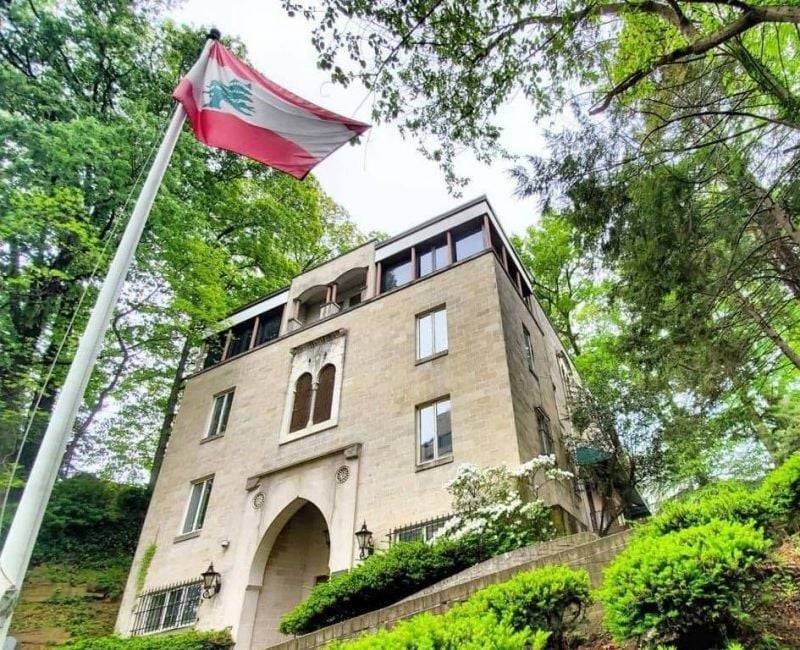
The headquarters of the Lebanese embassy in Washington. (Credit: Embassy of Lebanon in Washington D.C. Facebook page).
The Foreign Affairs Ministry’s civil servants haven’t been able to collect their salaries, which depend on the signature of the Finance Minister, in months.
“We are facing today the worst management of the foreign affairs [ministry] since independence in 1943.”
This is how a close associate of Parliament Speaker Nabih Berri described the situation at the Bustros Palace to L’Orient Le-Jour.
Most recently, Lebanese diplomats abroad haven’t received their salaries for months. In theory, the reasons behind this are technical and logistical.
Yet, in Lebanon, party politics are never far from view and the Foreign Affairs Ministry is no exception to this rule.
The diplomats who have been denied their salaries seem to be paying the cost of a long-standing tug-of-war between the Free Patriotic Movement (FPM) and its top local adversary, Parliament Speaker Nabih Berri.
To better understand this, one needs to rewind to a few months back. During the summer, caretaker Foreign Affairs Minister Abdallah Bou Habib, who leans towards the FPM, made a series of appointments and reshuffles among Grade 3 civil servants (diplomatic secretaries).
This move caused discontent in Ain al-Tineh. Those close to Berri denounced that Bou Habib did not respect “the agreement reached with the parliament speaker.”
This is why caretaker Finance Minister, Youssef Khalil, who is close to Berri, has not signed the decree to release the diplomats’ salaries in dollars.
Faced with this version of the story, which several civil servants shared with L’Orient-Le Jour, the Foreign Affairs Ministry said the matter is strictly technical.
“The main reason behind the delay is that the payment procedure has been changed since the end of BDL governor Riad Salameh’s term of office [July 31],” said a source close to the matter.
“While the former BDL governor readily agreed to respond to the public administrations’ requests, the current acting governor [Wassim Mansouri] has refused to finance the state. The Foreign Affairs Ministry therefore had to obtain the approval of the Finance Ministry to pay the diplomats’ salaries by dipping into the Finance Ministry’s account [in fresh dollars] with BDL,” added the source who declined to be named.
The Foreign Affairs Ministry made this request in particular for the months of August and September, the above-mentioned source added. The ball is therefore in the court of Finance Minister Khalil.
A technicality?
Secretary General of the Ministry of Foreign Affairs, Hani Shmaitli paved the way for this move. On Sept. 22, Shmaitli sent an official letter to the Finance Ministry asking it to approve the payment of salaries, which totaled $2,215,557, by dipping into the Finance Ministry’s BDL account.
The initiative might not come around, since Berri denounced a formal defect in the missive that Shmaitli sent.
“Mr. Shmaitli’s name appears below that of Abdallah Bou Habib. We, therefore, asked that the formal procedures be respected before making any decision,” said the above-mentioned source who is close to Berri.
In diplomatic circles, however, it is reported that Shmaitli opted for this decision so that civil servants’ salaries aren’t delayed longer. “He doesn’t want to wait for the return of Abdallah Bou Habib, who is currently on holiday in Washington,” said a diplomat who asked to remain anonymous.
And that’s not all. Besides the salaries of Lebanon’s diplomats abroad, the Foreign Affairs Ministry is asking Khalil to allow the opening of a credit to cover salaries of diplomats sent on mission abroad, as well as civil servants affected by Grade 3 reshuffles, knowing that many are due to leave Lebanon between now and mid-October to return to their assigned chancelleries.
“The problem is not related to the Finance Ministry. The Foreign Affairs Ministry wants to make appointments and reshuffles and incur expenses that it cannot cover,” said a close associate to Berri, as if trying to clear Khalil’s name. Yet, it remains that the keys to the Treasury are in Ain al-Tineh.
This article was originally published in French.